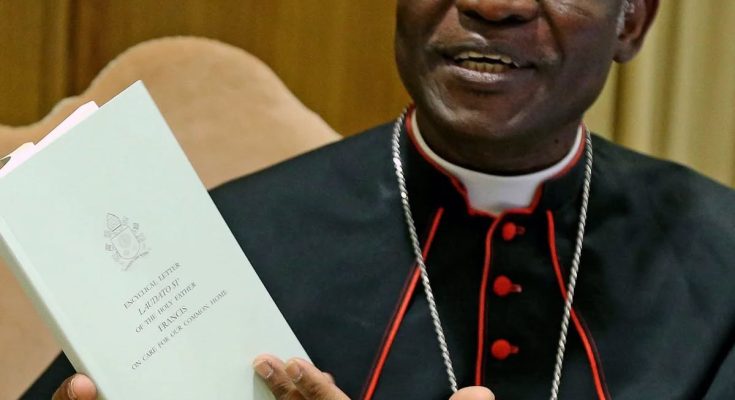Ahead of conference on pope’s environment encyclical, Cardinal Peter Turkson says to achieve development goals women need more access to education
The Vatican’s top official on justice issues has said giving women greater access to education is imperative to achieving global development goals, as debate heats up before a UN meeting on the topic in September.
“Investing in women can take us a long way towards achieving forms of development,” Cardinal Peter Turkson told the Guardian on Friday. The Ghanaian cleric was reflecting on comments made at the Vatican by Mary Robinson, the UN secretary general’s special envoy for climate change, who said there needed to be more focus on the education of girls and women.
Robinson was at the Holy See for a two-day conference on the pope’s environmental encyclical, which criticised world leaders for inaction on climate change and urged people to change their wasteful lifestyles.
Turkson said that in discussing environmental damage it was necessary to debate development. “The discussion of the encyclical and climate change really leads to sustainable goals, so the two usually go hand in hand,” he said.
At the UN meeting in September, governments are due to commit to sustainable development goals.
Focusing on the encyclical, Turkson warned against discussing the document as solely a commentary on climate change, a misinterpretation he observed while visiting the UN’s headquarters in New York last month. “[The encyclical] was about ecology, which is far broader than climate change. It’s a mistake to talk about an encyclical on climate change,” he said.
The papal letter has nonetheless won the backing of climate change activists globally and brought some unlikely non-Catholic campaigners, such as the anti-capitalist author Naomi Klein, to the heart of the debate.
Turkson followed the pontiff’s inclusive message and stressed that care for the environment was not just up to Catholics. He said: “The pope said nothing is too small or insignificant; everyone can support a line of action to respond to the needs that we have and changing their lifestyles. There’s something for everybody.”
Facts are sacred. Help protect them.
Throughout the Guardian’s 204-year history, journalism has been a complex and expensive endeavour. But now, in 2025, we face new kinds of challenges, of a type largely unimaginable in the past.
The economic model of the news industry has been ripped up by the technology giants, and thousands of newspapers around the world have closed or dramatically shrunk over the past two decades. Their absence leaves a hole filled by social media networks and accompanying tides of misinformation.
Politically too, journalists are under increasing pressure. From threats of exclusion and repression to violence, antidemocratic and authoritarian leaders around the world want to exert control over the press. It’s important we stand up for journalism and democracy.
Over the course of the next few weeks we are reminding readers around the world of the importance of, and the urgent need for, a free and independent press. We are also asking readers like you in Cambodia to help secure the Guardian’s future independence by becoming one of 50,000 new supporters during this period.
If you can afford it, please consider becoming a regular backer of our work from just $3 per month. We value whatever you can spare, but supporting on a monthly basis makes the most impact, enabling greater investment in our most crucial, fearless journalism.




